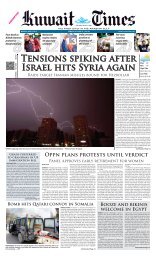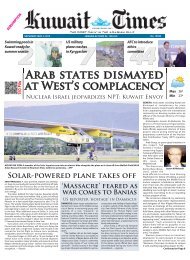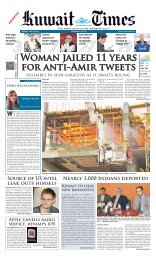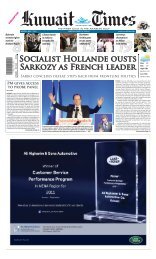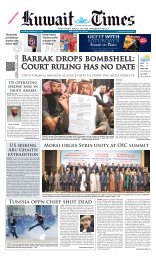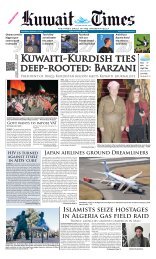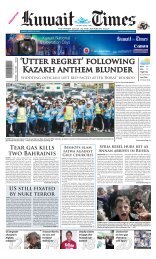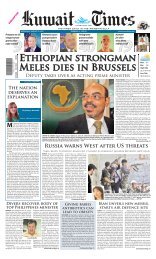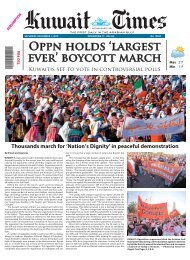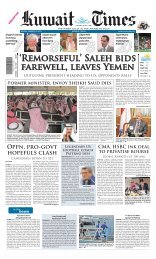KT 3-4-2013_Layout 1 - Kuwait Times
KT 3-4-2013_Layout 1 - Kuwait Times
KT 3-4-2013_Layout 1 - Kuwait Times
You also want an ePaper? Increase the reach of your titles
YUMPU automatically turns print PDFs into web optimized ePapers that Google loves.
INTERNATIONAL<br />
Japan welcomes JFK daughter as mooted US envoy<br />
TOKYO: The mooted appointment of the daughter<br />
of assassinated US president John F Kennedy to the<br />
high-profile post of ambassador to Japan, was greeted<br />
enthusiastically in Japan yesterday. Caroline<br />
Kennedy, 55, who was an early supporter of Obama’s<br />
2008 primary campaign before he took on and beat<br />
Hillary Clinton’s Democratic machine, has long been<br />
a rumored candidate for the plum Tokyo post.<br />
Kennedy is in the advanced stages of the selection<br />
process, an administration official told AFP.<br />
Earlier Monday, both The Washington Post and New<br />
York <strong>Times</strong> reported that she was actively being vetted<br />
for the appointment. Japan’s top government<br />
spokesman said it would be a “big news” for the<br />
country if she gets the nomination. “Late President<br />
Kennedy was a figure familiar to many Japanese,”<br />
Yoshihide Suga said at a regular press conference on<br />
Tuesday.<br />
“It would be big news, and would deepen people’s<br />
feeling of friendliness (to the United States),” he<br />
said, adding that he would refrain from commenting<br />
further until a final decision was made. Kennedy<br />
would fit the long tradition of presidents naming<br />
high profile envoys to key US ally Japan, who have<br />
included former vice president Walter Mondale and<br />
former senators Mike Mansfield and Howard Baker.<br />
But she would also take up the post at a time of great<br />
diplomatic peril, given North Korea’s fierce military<br />
threats against the United States and its key regional<br />
partners.<br />
The crises had prompted some diplomatic<br />
observers in Washington in recent weeks to suggest<br />
that Kennedy could be passed over for a more experienced<br />
diplomatic hand. But Kennedy’s chances may<br />
have been enhanced by the arrival as secretary of<br />
state of John Kerry, who was close to Caroline<br />
Kennedy’s beloved uncle, late senator Edward<br />
Kennedy. The White House and State Department<br />
both declined to comment on the reports that<br />
Kennedy was close to being named, but did not deny<br />
them outright.<br />
While politics and public service runs in Kennedy’s<br />
blood, she has long resisted the public role of her<br />
father, his brothers, Robert F. Kennedy and Edward<br />
Kennedy, and many of their progeny. For a time in<br />
late 2008 and early 2009, she toyed with the idea of<br />
running for the New York Democratic Senate seat<br />
vacated by Hillary Clinton when Clinton became<br />
Obama’s first-term secretary of state. But the wealthy<br />
Kennedy pulled out after a rough political ride amid<br />
claims she was being foisted upon the New York<br />
electorate with nothing but her family name as a<br />
qualification.<br />
Kennedy, whom many Americans remember as a<br />
tragic little girl at her father’s 1963 funeral at<br />
Arlington National Cemetery, caused a sensation in<br />
2008, and fury in Clinton circles, when she broke<br />
from her intensely private world to back Obama. In a<br />
New York <strong>Times</strong> column titled “A President Like My<br />
Father” Kennedy wrote of never having seen a president<br />
who matched up to the way people still talked<br />
about JFK. Now, she said, “I believe I have found a<br />
man who could be that president.” If nominated, and<br />
confirmed by the Senate, Kennedy would succeed<br />
current US Ambassador to Japan John Roos, a former<br />
Obama campaign donor. — AFP<br />
PYEONGTAEK: A US Air Force F-16 fighter jet (center) lands on the runway during their military exercise at the Osan US Air Base in Pyeongtaek,<br />
south of Seoul, South Korea yesterday. — AP<br />
US deploys warship off South<br />
Korea amid soaring tensions<br />
North Korea says region on brink of nuclear war<br />
SEOUL: The United States has positioned a warship<br />
off the Korean coast as a shield against ballistic<br />
missile attack as South Korea’s new president<br />
vowed swift retaliation against a North<br />
Korean strike amid soaring tensions on the<br />
peninsula. But Washington also said it had seen<br />
no worrisome mobilization of armed forces by<br />
the North Koreans despite bellicose rhetoric over<br />
a ramping up of international sanctions against<br />
Pyongyang over nuclear weapons tests.<br />
“If there is any provocation against South<br />
Korea and its people, there should be a strong<br />
response in initial combat without any political<br />
considerations,” South Korean President Park<br />
Geun-hye told the defense minister and senior<br />
officials. North Korea says the region is on the<br />
brink of a nuclear war in the wake of UN sanctions<br />
in response to its February nuclear test and<br />
a series of joint US and South Korean military<br />
drills that have included a rare US show of aerial<br />
power. In Washington, the White House has said<br />
the United States takes seriously North Korea’s<br />
war threats. But White House spokesman Jay<br />
Carney said on Monday: “I would note that<br />
despite the harsh rhetoric we are hearing from<br />
Pyongyang, we are not seeing changes to the<br />
North Korean military posture, such as largescale<br />
mobilizations and positioning of forces.”<br />
North Korea further escalated its rhetoric on<br />
Saturday by saying it was entering a “state of war”<br />
with South Korea in response to what it termed<br />
the “hostile” military drills.<br />
A US defense official said the USS McCain, an<br />
Aegis-class guided-missile destroyer used for ballistic<br />
missile defense, was being positioned off<br />
the peninsula’s southwestern coast. “This is a<br />
prudent move that provides greater missile<br />
defense options should (they) become neces-<br />
SYDNEY: Global media baron Rupert Murdoch<br />
yesterday accused the government of his native<br />
Australia of “disgraceful and racist” language<br />
over a crackdown on visas for skilled migrants.<br />
The Australian-born News Corporation chief<br />
condemned the centre-left Labor government’s<br />
rhetoric about the tightening of the 457-class<br />
skilled visa program amid claims of abuse by<br />
employers and disadvantage to local workers. “I<br />
think the way that they’re talking about the 457<br />
is pretty disgraceful and racist, but I’m a big one<br />
for encouraging immigration, I think that’s the<br />
future,” Murdoch told Sky News on a business<br />
visit to northern Australia.<br />
“A mixture of people-just look at America-is<br />
just fantastic,” he added. Murdoch said there<br />
were “difficulties for generations of migrants<br />
UNITED NATIONS: The UN General Assembly<br />
overwhelmingly approved the first UN treaty<br />
regulating the multibillion-dollar international<br />
arms trade yesterday, a goal sought for over<br />
a decade to try to keep illicit weapons out of<br />
the hands of terrorists, insurgent fighters and<br />
organized crime. The resolution adopting the<br />
landmark treaty was approved by a vote of<br />
154 to 3 with 23 abstentions.<br />
As the numbers appeared on the electronic<br />
board, loud cheers filled the assembly<br />
chamber. A group of treaty supporters sought<br />
a vote in the 193-member world body after<br />
Iran, North Korea and Syria blocked its adoption<br />
by consensus at the end of a two-week<br />
sary,” said the official, speaking on condition of<br />
anonymity. The ship was not expected to participate<br />
in any exercises, the official added.<br />
South Korea has changed its rules of engagement<br />
to allow local units to respond immediately<br />
to attacks, rather than waiting for permission<br />
from Seoul. Stung by criticism that its response<br />
to the shelling of a South Korean island in 2010<br />
was tardy and weak, Seoul has also threatened to<br />
target young North Korean leader Kim Jong-un<br />
and to destroy statues of the ruling Kim dynasty<br />
in the event of any new attack, a plan that has<br />
outraged Pyongyang.<br />
CHINA CALLED TO HELP<br />
North Korea stepped up its rhetoric in early<br />
March, when US and South Korean forces began<br />
annual military drills that involved the flights of<br />
US B-2 stealth bombers in a practice run, prompting<br />
the North to put its missile units on standby<br />
to fire at US military bases in South Korea and in<br />
the Pacific. The United States also deployed F-22<br />
stealth fighter jets on Sunday to take part in the<br />
drills. The Pentagon said it was the fourth time F-<br />
22s had been deployed to South Korea.<br />
Australia, a close US ally and rotating UN<br />
Security Council member, said it would urge<br />
China to help enforce sanctions banning the flow<br />
of technology and equipment to North Korea.<br />
Australian Prime Minister Julia Gillard, who leaves<br />
on Friday for Beijing, plans to call on Chinese<br />
leaders to help bolster stop-and-search provisions<br />
for shipping to and from North Korea,<br />
Foreign Minister Bob Carr said. Canberra also<br />
plans its own banking and financial sanctions.<br />
“The immediate priority is to see the sanctions<br />
agreed on by the Security Council are properly<br />
enforced,” Carr said yesterday.<br />
KIM JONG-UN TIGHTENS GRIP<br />
North Korea has cancelled an armistice agreement<br />
with the United States that ended the<br />
Korean War and has cut all hotlines with US<br />
forces, the United Nations and South Korea. At a<br />
recent meeting of North Korea’s ruling Workers<br />
Party Central Committee, leader Kim Jong-un<br />
rejected the notion that Pyongyang was going to<br />
use its nuclear arms development as a bargaining<br />
chip for foreign aid for the impoverished<br />
nation.<br />
“The nuclear weapons of Songun Korea are<br />
not goods for getting US dollars and they are ...<br />
(not) to be put on the table of negotiations<br />
aimed at forcing the (North) to disarm itself,”<br />
KCNA news agency quoted him as saying.<br />
Songun is the Korean word for the “Military First”<br />
policy preached by Kim’s father who used it to<br />
justify the use of the impoverished state’s scarce<br />
resources to build a 1.2-million strong army and<br />
pursue development of weapons of mass<br />
destruction. At the meeting, Kim appointed a<br />
handful of personal confidants to the party’s<br />
politburo, further consolidating his grip on power<br />
in the second full year of his reign.<br />
Former premier Pak Pong-ju, a key confidant<br />
of the leadership dynasty, was re-appointed to<br />
the post from which he was fired in 2007 for failing<br />
to implement economic reforms. Pak,<br />
believed to be in his 70s, is viewed as a key ally<br />
of Jang Song-thaek, the young Kim’s uncle and<br />
also a protege of Kim’s aunt. Pak is viewed as a<br />
pawn in a power game that has seen Jang and<br />
his wife re-assert power over military leaders.<br />
Analysts said the move would not likely change<br />
North Korea’s approach to a confrontation that<br />
appears to have dragged the two Koreas closer<br />
to war. — Reuters<br />
Murdoch slams ‘racist,<br />
disgraceful’ Australia<br />
sometimes if there are too many from one area,<br />
but they meld in a couple of generations and it<br />
leads to tremendous creativity in the community”.<br />
He said skilled migration was vital to economic<br />
growth in Australia’s north, which is in the<br />
grip of a mining and resources boom with billions<br />
of dollars of investment slated for the coming<br />
years.<br />
Assistant Treasurer David Bradbury rejected<br />
the remarks, saying there was “nothing racist<br />
about standing up for jobs and job opportunities<br />
for Australians”. There is little love lost<br />
between Murdoch’s Australian operations News<br />
Limited and Prime Minister Julia Gillard’s Labor<br />
government-ministers have accused his newspapers<br />
of campaigning for regime change. News<br />
Limited has, in turn, been highly critical of the<br />
final negotiating conference last Thursday.<br />
The three countries voted “no” yesterday’s resolution<br />
while Russia and China, both major<br />
arms exporters, abstained.<br />
Many countries, including the United<br />
States, control arms exports. But there has<br />
never been an international treaty regulating<br />
the estimated $60 billion global arms trade.<br />
Australian Ambassador Peter Woolcott, who<br />
chaired the negotiations, said the treaty will<br />
“make an important difference by reducing<br />
human suffering and saving lives.”<br />
“We owe it to those millions - often the<br />
most vulnerable in society - whose lives have<br />
been overshadowed by the irresponsible and<br />
government’s proposed media reforms which<br />
came in the wake of Britain’s phone-hacking<br />
scandal.<br />
Gillard’s Labor has been criticized by the leftleaning<br />
Greens party, commentators and some<br />
business leaders for plans to crack down on 457s<br />
in an election year, accused of angling for the<br />
anti-immigration vote. According to the immigration<br />
department, growth in 457 visas has significantly<br />
outstripped national employment<br />
growth, suggesting “the program is being<br />
increasingly driven by temporary visa holders<br />
seeking to remain in Australia instead of the<br />
demands of the Australian labor force”. The number<br />
of 457 visa holders expanded 21.5 percent<br />
between February 2012 and February <strong>2013</strong> to<br />
107,510. — AFP<br />
illicit international trade in arms,” he told the<br />
assembly just before the vote.<br />
The treaty will not control the domestic<br />
use of weapons in any country, but it will<br />
require countries that ratify it to establish<br />
national regulations to control the transfer of<br />
conventional arms, parts and components<br />
and to regulate arms brokers. It covers battle<br />
tanks, armored combat vehicles, large-caliber<br />
artillery systems, combat aircraft, attack helicopters,<br />
warships, missiles and missile launchers,<br />
and small arms and light weapons.<br />
A phrase stating that this list was “at a minimum”<br />
was dropped, according to diplomats,<br />
at the insistence of the United States.<br />
Caroline Kennedy<br />
JAKARTA: The elite police unit on the front<br />
line of Indonesia’s lauded terrorism clampdown<br />
faces fresh allegations of torture and<br />
unlawful killings, raising concerns it is<br />
fuelling the jihadist cause. Detachment 88<br />
was established after the 2002 bombings on<br />
Bali that killed 202 people, mostly Western<br />
tourists, and has gained strong public support<br />
after claiming the scalps of some of the<br />
region’s most-wanted extremists. But last<br />
month a video emerged in which officers<br />
from the anti-terror unit interrogated a suspect<br />
writhing in pain after he had been shot<br />
in the chest and forced to strip to his underwear.<br />
“Why did you shoot me? I surrendered,” he<br />
screams, as police repeatedly yell back that<br />
he ask Allah for forgiveness. “You’re going to<br />
die,” they say, trampling on three other suspects,<br />
shooting into the ground to intimidate<br />
them. The suspect who was shot in the video,<br />
Rahman Kalahe, survived the incident and<br />
was sentenced to 19 years’ jail over his role in<br />
the beheading of three Christian schoolgirls<br />
and the murder of a priest in Poso.<br />
However, the footage has prompted the<br />
National Human Rights Commission to<br />
reopen its investigation into the 2007 raid,<br />
while Islamic groups and members of parliament<br />
have made calls to disband<br />
Detachment 88. “Detachment 88 has used<br />
torture, killings and intimidation, but they are<br />
never held accountable. The unit must be dissolved,”<br />
said Din Syammsuddin, chairman of<br />
the nation’s second-largest Muslim organization,<br />
Muhammadiyah, who took the video to<br />
police.<br />
The government insists that its security<br />
forces have “great respect for human rights”.<br />
“There are standard operating procedures in<br />
the handling of terrorism. It is not true that<br />
Detachment 88 employs a shoot-to-kill<br />
approach,” presidential spokesman Julian<br />
Aldrin Pasha said. “Any actions contrary to the<br />
law, including human rights law, will be<br />
processed. Without exception for anyone.<br />
This country upholds and enforces the rule of<br />
law,” he said. The Detachment 88 unit, which<br />
gets funding and training from the United<br />
States and Australia, has been successful in<br />
quelling the kind of militant attacks on civilian<br />
targets that rocked Indonesia in the past<br />
decade.<br />
Indonesia’s battle with terror is now being<br />
fought almost entirely between militants and<br />
police, much of it in Poso district-a known<br />
hotbed for militant activity on Sulawesi<br />
island, where the videotaped raid took place.<br />
WEDNESDAY, APRIL 3, <strong>2013</strong><br />
Indonesia anti-terror cops<br />
accused of ‘fuelling jihad’<br />
This shift in the nature of terrorism in<br />
Indonesia has raised concerns that the unit’s<br />
treatment of suspects is fuelling revenge<br />
attacks. Since the establishment of<br />
Detachment 88, Indonesian police have<br />
killed at least 90 suspects in counterterrorism<br />
operations, the International Crisis Group<br />
reported.<br />
But fully 50 of them have been killed since<br />
2010, a year after the last major deadly attack<br />
in the nation. “You can see why people get<br />
angry when the police start shooting people<br />
just because they have a copy of a book on<br />
jihad in their rooms,” Todd Elliot, Jakartabased<br />
terrorism analyst with Concorde<br />
Consulting said. “When we haven’t seen a<br />
major attack in years and police are killing<br />
terror suspects every two months, you can<br />
understand why people are asking questions.”<br />
National Anti-Terror Agency chief<br />
Ansyaad Mbai denies the unit is trigger-happy,<br />
saying the deaths happen because terror<br />
suspects rarely surrender and are often<br />
armed. The numbers seem to support his<br />
argument-in the same period that 50 suspects<br />
were killed, 21 police were slain trying<br />
to make arrests or investigate extremist activity.<br />
In October, two officers investigating an<br />
alleged terrorist camp in Poso were found<br />
dead and buried in a hole with their throats<br />
slit. “Terrorism is an extraordinary crime that<br />
requires extraordinary operations,” Mbai said.<br />
“They don’t respect Indonesians’ rights, so<br />
why are we suddenly so concerned with<br />
theirs?” he said. “Since Detachment 88 was<br />
established, we have captured 850 terrorists.<br />
Yes, dozens have been killed, but most were<br />
taken alive.” Mbai sees the video as the latest<br />
tactic in a long-standing campaign against<br />
the unit, likely from political factions or hardline<br />
Islamic groups that regularly paint<br />
Detachment 88 as anti-Muslim. The rights<br />
commission has recommended Detachment<br />
88 employ a more transparent evaluation<br />
process and the unit be held accountable for<br />
any extra-judicial killings.<br />
But Mbai said: “I don’t agree with these<br />
calls to hold officers to account through legal<br />
procedures. This will just demoralize the unit.”<br />
Problems within Detachment 88 are not<br />
unique to the unit. The UN’s Special<br />
Rapporteur on Torture in 2008 found that<br />
torture and abuse of suspects during arrest<br />
and police detention were widespread in<br />
Indonesia. “The video indicates a definite<br />
need for better human rights training. The<br />
whole police institution in Indonesia is still in<br />
need of reform,” Elliot said. — AFP<br />
BEKASI: Indonesian Christian Pastor Torang Simanjuntak (bottom) delivers mass next<br />
to the ruins of the Taman Sari Batak Christian Protestant Church in Bekasi, on the outskirts<br />
of Jakarta as minority Christians mark Easter amid rising cases of religious<br />
intolerance. On March 21 the local government demolished the half constructed<br />
church in front of its weeping congregation. Indonesia’s 240 million people identify<br />
themselves as Muslim but the constitution guarantees freedom of religion. — AFP<br />
UN adopts treaty to regulate global arms trade<br />
Supporters complained that this limited the<br />
treaty’s scope. The treaty prohibits states that<br />
ratify it from transferring conventional<br />
weapons if they violate arms embargoes or if<br />
they promote acts of genocide, crimes against<br />
humanity or war crimes. It also prohibits the<br />
export of conventional arms if they could be<br />
used in attacks on civilians or civilian buildings<br />
such as schools and hospitals.<br />
In considering whether to authorize the<br />
export of arms, the treaty says a country must<br />
evaluate whether the weapon would be used<br />
to violate international human rights or<br />
humanitarian laws or be used by terrorists or<br />
organized crime. They must also determine<br />
whether the weapons transfer would contribute<br />
to or undermine peace and security.<br />
The treaty also requires parties to the<br />
treaty to take measures to prevent the diversion<br />
of conventional weapons to the illicit<br />
market.<br />
Ammunition was been a key issue in negotiations,<br />
with some countries pressing for the<br />
same controls on ammunition sales as arms,<br />
but the US and others opposed such tough<br />
restrictions. The final text calls for each country<br />
that ratifies the treaty to establish regulations<br />
for the export of ammunition “fired,<br />
launched or delivered” by the weapons covered<br />
by the convention. — AP



